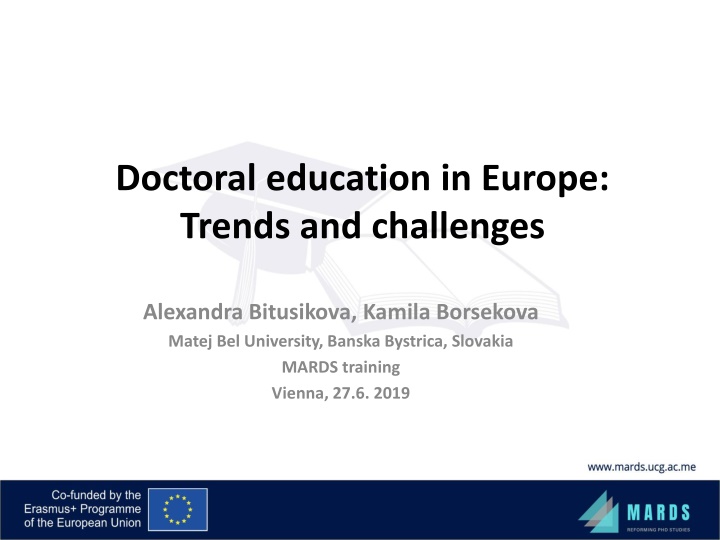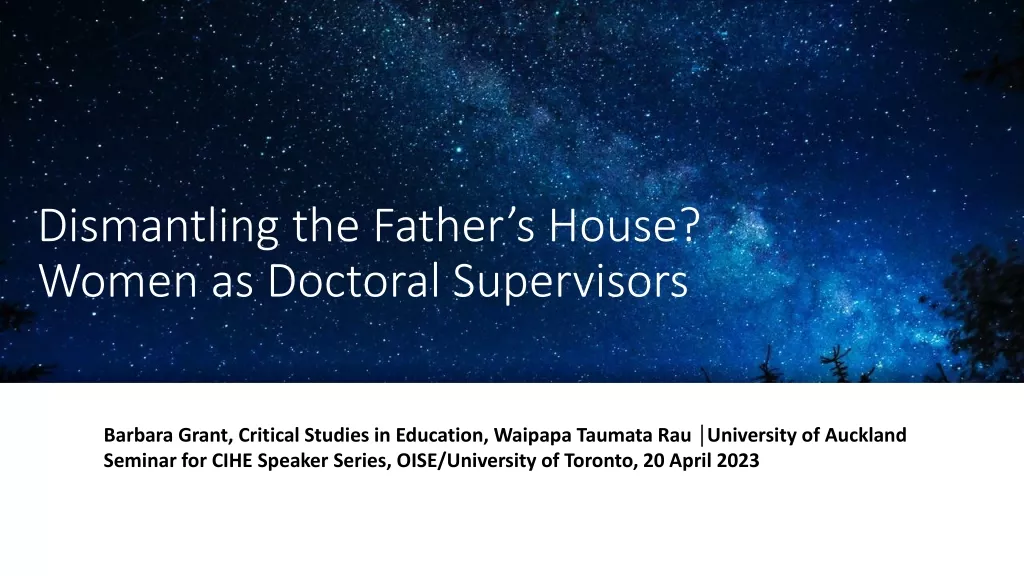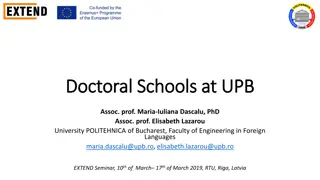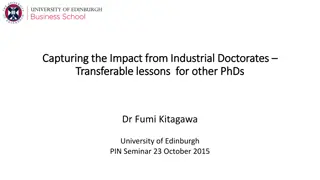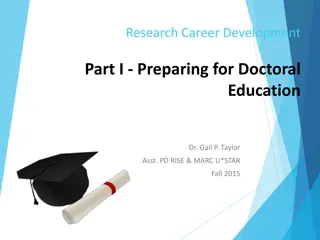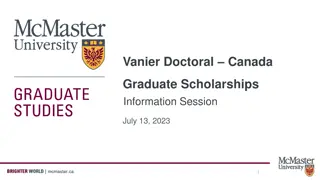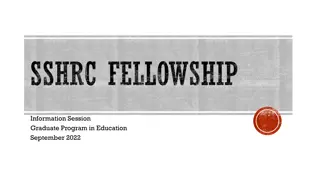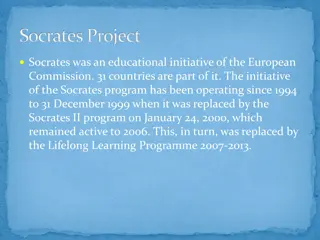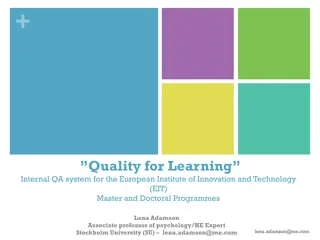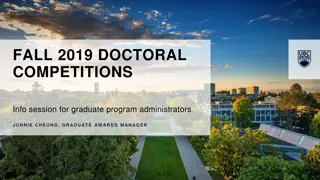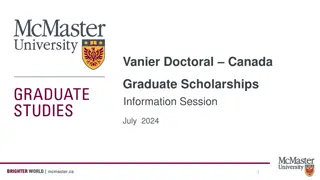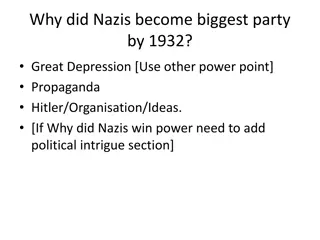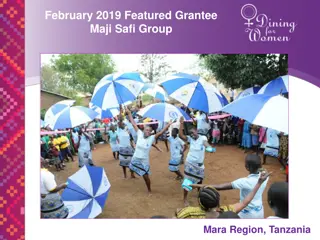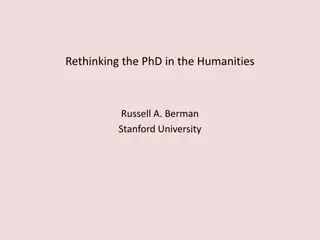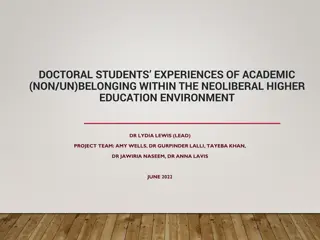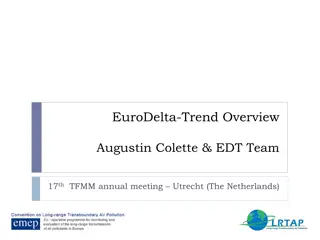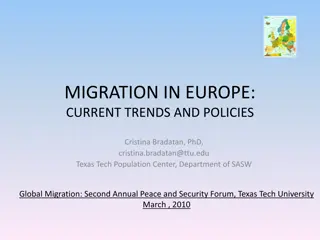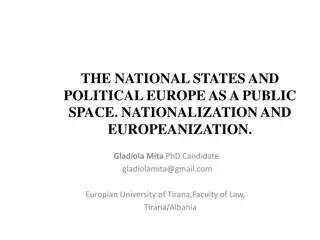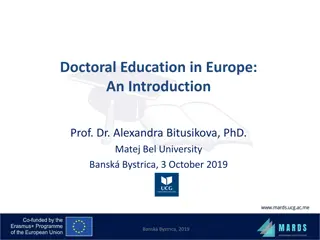Trends and Challenges in European Doctoral Education
Examining the shifting landscape of doctoral education in Europe, this article delves into key developments, challenges, and the impact of knowledge society on academia. It explores the evolving competencies required for doctoral graduates, the global war for talent, and the intersection of European Higher Education and Research Areas.
Download Presentation

Please find below an Image/Link to download the presentation.
The content on the website is provided AS IS for your information and personal use only. It may not be sold, licensed, or shared on other websites without obtaining consent from the author.If you encounter any issues during the download, it is possible that the publisher has removed the file from their server.
You are allowed to download the files provided on this website for personal or commercial use, subject to the condition that they are used lawfully. All files are the property of their respective owners.
The content on the website is provided AS IS for your information and personal use only. It may not be sold, licensed, or shared on other websites without obtaining consent from the author.
E N D
Presentation Transcript
Doctoral education in Europe: Trends and challenges Alexandra Bitusikova, Kamila Borsekova Matej Bel University, Banska Bystrica, Slovakia MARDS training Vienna, 27.6. 2019
STRUCTURE Doctoral education in contexts (academic, European and global) Important developments and documents Key trends in doctoral education in Europe New challenges for doctoral education
Setting the scene The world is changing knowledge society and ecomomy has become the key driver (for scientists, educationists, politicians, businesses...) Focus on knowledge society has a serious impact on academia: Rapid growth of students in HE incl. doctoral students Differentiation of profiles, functions, roles and tasks of universities as well as of academic profession Growing competition among universities and obsession with reputation, rankings, leage tables and excellence Pressure on accountability (auditing, evaluations, accreditations, monitioring, controlling) Academic freedom? Trust? 3
Impact on doctoral education Knowledge society requires a new set of competences and skills. Academic career of doctoral graduates is no longer the only career path (though many supervisers still prepare doctoral students for academic career only) motifs to do the PhD differ. The generation of knowledge, the development of epistemological and methodological expertise is not enough, also organisation, management and dissemination of knowledge and with it a much wider transferable skills base is needed. Words such as employability, adaptability, flexibility, innovation, creativity, critical thinking describe what is expected from a new doctoral holder. 4
Doctoral education in the changing world Doctoral education on the top of the agenda of university leaders worldwide Massive increase of doctoral students (and graduates), in Europe 50% on average since 2004 Global war for talent Triple i-: international, interdisciplinary, intersectoral Shift from individual exercise to collaborative research Increased focus on research (less on teaching) New organisation of DE as a consequence 5
Doctoral Education in the European context Doctoral education = bridge between European Higher Education and Research Areas (EHEA and ERA) Major transformation of doctoral education since mid-2000: a silent revolution Diversity (different national and regional adademic/ research traditions and cultures) High political attention: Bologna Process (doctoral educationincluded in 2003) EU policies: Lisbon objectives, ERA Green Paper, Modernisation Agenda for universities, Grand challenges, Innovation Union: A Europe 2020 Initiative, Principles for Innovative Doctoral Training, Report of Mapping Exercise on Doctoral Training, A New Skills Agenda for Europe) National policies and legislation 6
EUA Council for Doctoral Education (EUA-CDE) The key actor in doctoral education in Europe Established in 2008 as a membership service of the European University Association A forum for cooperation and exchange of good practices among doctoral programmes/schools across universities in Europe and worldwide 240 university members from 33 countries Collaboration with other university associations (UNICA, LERU, COIMBRA, CGS) Main documents: Salzburg Principles I (2005), Salzburg recommendations II (2010), Taking Salzburg Forward (2016), Survey Doctoral education in Europe today: approaches and institutional structures (2019)
Salzburg Principles I (2005) The core component of doctoral training is the advancement of knowledge through original research. Embedding in institutional strategies and policies The importance of diversity Doctoral candidates as early stage researchers The crucial role of supervision and assessment Achieving critical mass Duration The promotion of innovative structures Increasing mobility Ensuring appropriate funding 8
Salzburg II Recommendations (2010) Based on consultation with CDE members (workshops, focus groups and annual meeting) and focused on implementation of reforms Results: large consensus about the research basis of the doctorate 1. Original research as the basis of the doctorate and as the difference from the other two cycles 2. Space for and focus on individual development 3. Insitutional autonomy to choose the mission and strategy and to set up the appropriate structures 9
Key trends: I. Structured programmes/ schools Trend towards structured programmes and doctoral/ research/ graduate schools The rise of the doctoral/ graduate/ research school (30% of institutions had them in 2007, 65% 2009, 82% 2011) Diversity of models (usually covering only PhDs), but move towards a 2-layered model of faculty/programme level schools or disciplinary schools, and central strategic units Aim: to create a critical mass, stimulate research environment, enhance interdisciplinarity and inter-institutional collaboration, improve time to degree and completion rates, improve quality while keeping diversity One goal, different routes
II. Supervision and assessment Supervision - a major topic of the debate and an important aspect of quality assurance It is one of the most complex of academic activities. Despite the fact we abandoned the apprenticeship (Master-slave) model of the doctorate, the supervisor-supervisee relationship remains the cornerstone of the process leading to the doctorate. The demands on the supervisor have increased in the new doctoral education, and require continuing professional development (opportunities) for supervisors. 11
II. Supervision and assessment trends Supervision A collective effort with clearly defined responsibilities of PhD candidate, supervisor and institution (a contract signed by 3 parties) Multiple supervision encouraged (in international supervision: community of supervisors) Providingprofessional development to supervisors (training) is an institutional responsibility (different formats depending on academic culture) Monitoring of supervisors (carrots and sticks) Priority: to develop a common supervision culture
III. Outcomes The main outcome of doctoral education: the early stage researcher with specific research related and transferable skills, competences and experiences, which can be used in a wide range of careers The outcome of doctoral research: the dissertation (a publishable monograph, several peer reviewed papers or a consistent artistic work with a theoretical publication) defended in public in the presence of an examining board and opponents
IV. Career development Career support for doctoral candidates: focus on individual goals and motivations and on a wide range of careers for doctoral holders. It is the institutional responsibility to provide support for professional development (e.g. by offering transferable skills training, career services) and responsibility of supervisors to encourage doc. candidates to take part in these courses The aim: to raise awareness among doctoral candidates of the importance of recognising and enhancing the skills that they develop and acquire through research, as a means of improving their employment/ career prospects inside & outside academia. Only about 4% of PhD grads end up working in academia!
V. Quality and accountability Important to develop specific internal systems for quality assurance (based on institutional mission/ strategy). Assessment of academic/ research quality of DE should be based on peer review and be sensitive to disciplinary differences. Quality assurance bodies are increasingly interested in assessment/ evaluation/ accreditation of doctoral education (output-based: staff qualifications, publications of PhDs, number of PhDs, TTD, completion rates, employability, guidelines...) In order to be accountable, institutions should develop indicators based on institutional priorities (individual progression monitoring, completion rate, career tracking, dissemination of research results). But: Avoid over-regulation
VI. Internationalisation and mobility Global problems require global solutions not possible without international cooperation The need for global competences of doctoral candidates: Ability to work across countries Communication across cultures Knowledge of global organisationsand contexts Personal adaptability to diverse culture Internationalisation in DE means diverse approaches: Internationalisation at home (recruitment of internat. students and staff; organising internat. events; involving doctoral candidates in internat.projects; inviting guest lecturers from abroad; networking, online courses incl. MOOCS, etc.) Internationalisation abroad (internat. exhanges, study periods abroad, collaborative and joint programmes, etc.)
Internationalisation and mobility (cont.) Internationalisation has to be embedded in institutional strategy It should take into account capacity building in all involved institutions and include mechanisms that facilitate the return of scholars to their home country (brain circulation) The aim: building an inclusive global research community that covers different countries, disciplines, contexts and that encourages research benefitial for humanity 18
VII. Intersectorial collaboration and mobility Mobility between academia and business/ industry can help to improve the prospects for employability, especially outside academia Doctoral candidates should be taught that moving from academia to industry is not a second choice, but a legitimate first choice Behind the formal procedures such as joint supervision or placements in industry, successful long-term university-industry cooperation is holistic: a continuous and long-term face-to-face experience is crucial for building trust and durable partnerships (often bottom-up) EUA DOC-CAREERS project I and II
VIII. Development of new Doctorates A range of innovative doctoral programmes emerge as a response to changes of a fast-growing global labour market (joint programmes, professional doctorates, industrial doctorates supported by the EU programmes, European doctorates etc.) Diversity of doctoral programmes and doctorates reflects diversity of European HEIs that have autonomy to decide on their programmes Consensus: original research has to remain the main component of all doctorates No consensus on professional doctorates in Europe (not well accepted in continental Europe - further debate on new doctorates as well as on a new vision and role of the doctorate is needed)
Professionalisation of doctoral education governance Growing challenges in doctoral education require hiring (or training) new staff that specialises in doctoral education a new job profile Tasks: Drafting policy papers for the management Collecting data on PhDs, TTD, completion rates, publications... Monitoring and quality control Organising training in transferable skills for doctoral students Organising professional development fora for supervisors (and awards Providing career advice, organising events with employers EU PRIDE project: Professionals in Doctoral Education, handbook at: http://phaidra.univie.ac.at/o:454303 21
New challenges: CDE Taking Salzburg Forward policy initiative Science 2.0 (Open sience, open big data, open education e.g. online courses) Research integrity and ethics (plagiarism, publishing in predatory journals, big data, data protection, IP rights) Capacity building and widening participation (connecting peripheral regions in the EU with prosperious ones new possibilities for twinning and teaming) Outreach collaboration with other stakeholders such as regional/local authorities and NGOs 22
Final quote All the changes are hard won; none of them occur easily, none of them occur through just doing one thing, none of them occur through a policy, and none of them occur through setting up an activity. They ve got to be continually reinforced. Whoever is in the position of authority can t do it all; no one person can do it all. The great success of the initiatives has been the diversity of people involved. (Angela Brew, David Boud & Janne Malfroy (2016): The role of research education coordinators in building research cultures in doctoral education, Higher Education Research & Development, DOI: 10.1080/07294360.2016.1177812) 23
